
by Ace Concierge | Virtual Assistant | Dec 23, 2024 | Delegation, Small Business, Work Life Balance
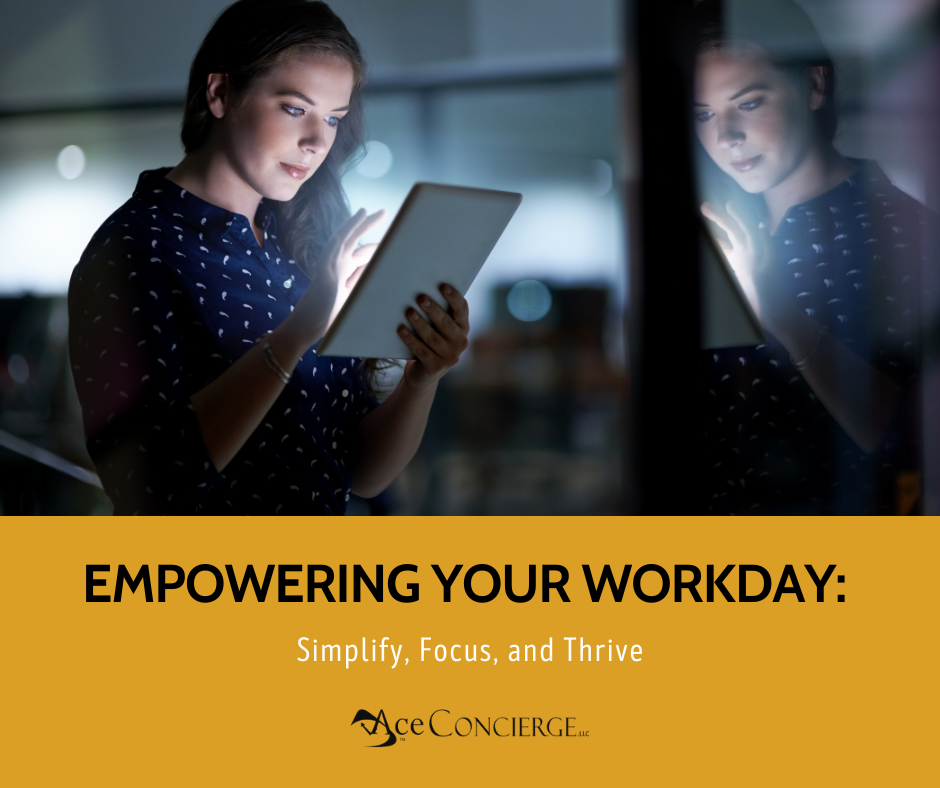
Every day begins with a rush—a barrage of emails, urgent requests, and endless tasks demanding your attention. Your mind is bombarded with responsibilities. Each task feels like a drop in a never-ending stream, filling your day with a sense of urgency and a constant need to react. There’s no room to breathe, no space to think beyond the next immediate crisis. It’s a cycle of perpetual motion with no clear destination in sight.
The demands are relentless. Meetings, emails, and client calls pull you in multiple directions, fragmenting your focus. Every interruption feels like an emergency, adding to the overwhelm. Each new task pulls you further away from what truly matters—your vision, long-term goals, and core genius. The more you try to keep up, the more you find yourself treading water, constantly struggling to stay afloat.
The urgent consumes your day, with little room for the important.
This isn’t just about managing tasks; it’s about managing your entire experience. The constant mental load of these demands can be exhausting, leaving you feeling disconnected and depleted. The pressure to stay on top of everything drains your energy, leaving you unable to find the clarity needed to make meaningful decisions. The more you juggle, the harder it becomes to see the wood for the trees.
You’re stuck in a reaction cycle, unable to break free.
Finding Clarity Amidst the Chaos
Overcoming this overwhelm starts with gaining clarity. It’s about understanding where your time is going and recognizing what truly matters to you and your business.
- What if you could identify and eliminate tasks that are merely distractions?
- What if you could automate routine activities?
- What if you could use systems to manage your workload and protect your mental space?
These changes free up significant time, allowing you to focus on what truly moves the needle for your business.
This shift isn’t about doing more; it’s about doing the right things. You can transform your experience from constant reaction to purposeful action by letting go of unnecessary tasks and distractions. It’s about reclaiming control over your time and energy, making each day an opportunity to achieve meaningful progress.
Instead of just surviving each day, you can thrive—seeing each challenge as an opportunity to grow and innovate.
Embracing a New Approach
To break free from the daily rush, you need a different mindset.
- Stop reacting to every demand and start protecting your focus.
- Set boundaries and learn to say no to distractions.
- Focus on what truly matters—not just the urgent.
You create space to think, plan, and grow by shifting your mindset.
By reclaiming your focus, you can transform overwhelm into empowerment. You move from merely surviving to actively shaping your day. Each task becomes a step toward achieving your goals. The more precise your path, the more control you have—moving from scattered chaos to purposeful clarity.
The key takeaway is that effectively managing time involves prioritizing essential tasks and eliminating distractions, leading to a more focused and intentional work life. Individuals can turn daily chaos into personal and professional growth opportunities by focusing on what truly matters.
Achieve more by doing less!
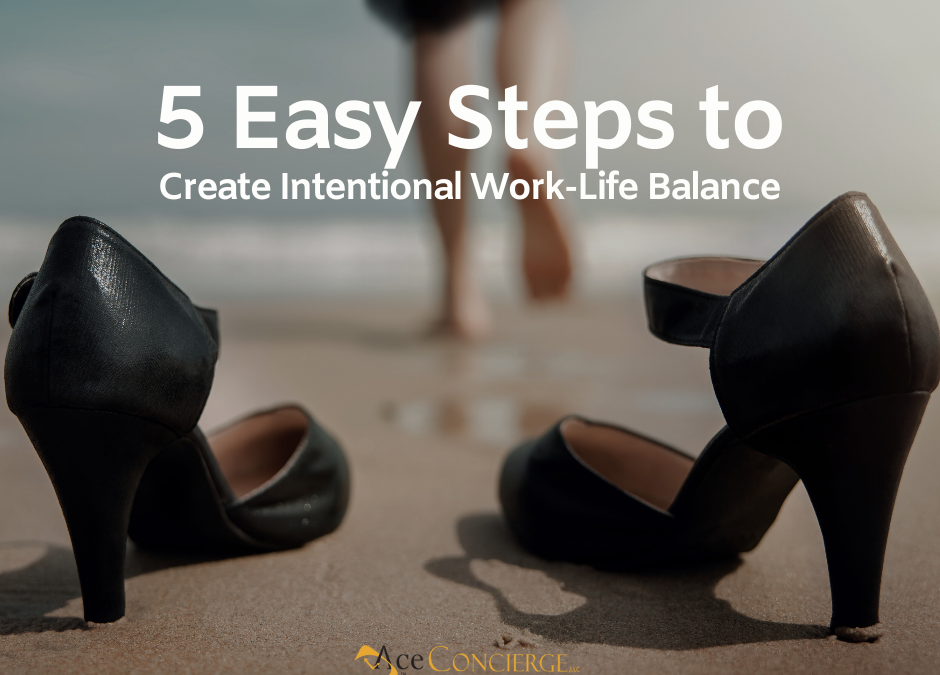
by Ace Concierge | Virtual Assistant | Apr 17, 2024 | Work Life Balance
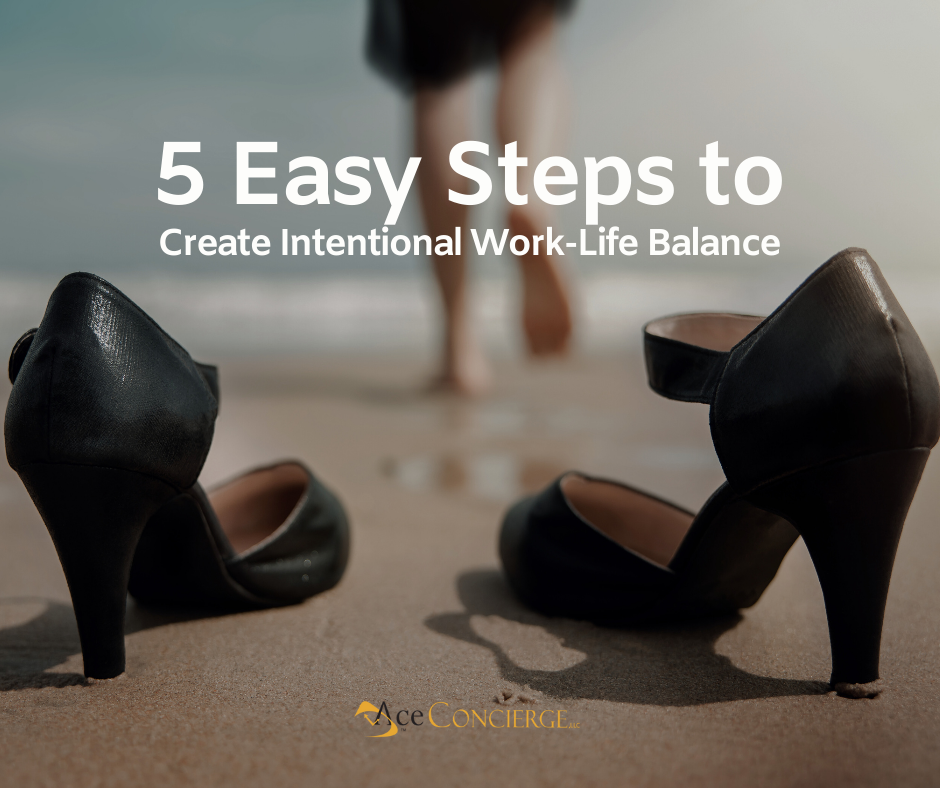
Work-life balance is a topic discussed to death, but for good reason.
Finding that elusive equilibrium between our professional and personal lives can feel impossible in our fast-paced, always-on world. I get it – I’ve been there.
There have been so many times when I’ve felt completely overwhelmed, like drowning in a sea of work deadlines, household chores, and family obligations. It’s enough to make anyone want to throw in the towel. However, the truth is that balance is not something you stumble upon by chance. It’s something you have to create and maintain through intentional effort and boundary-setting actively.
Be steady and well-ordered in your life so that you can be fierce and original in your work. Gustave Flaubert
The Importance of Work-Life Balance
In a recent survey, over half of workers reported feeling burned out, with the top contributing factors being an unmanageable workload and a lack of work-life balance. And it’s not just our mental health that suffers – poor work-life balance has also been linked to physical health issues like heart disease, obesity, and insomnia. Conversely, employees with a healthy work-life balance report higher job satisfaction, increased productivity, and better overall well-being. The bottom line is this: creating and maintaining a work-life balance isn’t just a nice-to-have – it’s essential for our professional and personal success. And it’s up to us as individuals to take the reins and make it happen.
Steps to Create Intentional Balance
So, how do we go about creating this elusive state of balance? It starts with being intentional and proactive. Here are some critical steps that have worked for me:
- Set Boundaries: One of the biggest challenges to work-life balance is the digital age’s constant connectivity. It’s all too easy for work to bleed into our time. That’s why setting clear boundaries around when you’re “on” and “off” the clock is crucial. This could mean turning off notifications after a certain time, avoiding checking email in the evenings, or even scheduling “no meeting” blocks in your calendar.
- Prioritize and Delegate: With endless to-do lists and competing priorities, it’s easy to feel overwhelmed. That’s why it’s important to get intentional about how you’re spending your time. Take a step back and identify your most important tasks and responsibilities. Then, look for opportunities to delegate or deprioritize less essential items. Don’t be afraid to say no to requests that don’t align with your priorities.
- Create a Schedule: A clear, structured schedule can be a game-changer regarding work-life balance. Block out time for work, exercise, family time, hobbies, and self-care. And be sure to build buffer time between activities to avoid feeling rushed. Experiment to find a rhythm that works for you.
- Unplug and Recharge: In our always-on world, making time to unplug and recharge is crucial. Whether it’s a weekly tech-free day, a monthly digital detox, or an annual vacation, fully permitting yourself to disconnect from work can do wonders for your mental and physical well-being.
- Cultivate Supportive Relationships: The people in our lives can significantly impact our work-life balance. Surround yourself with colleagues, friends, and family who understand the importance of balance and can help you maintain it. Don’t be afraid to lean on your support system when needed.
We respond to the environments we’re in. If you get the environment right, you get the right behavior. Simon Sinek
Putting it All Together
Creating and maintaining a work-life balance is an ongoing process, not a one-time fix. It requires constant self-awareness, boundary-setting, and course correction. But the payoff is well worth it. When we achieve that coveted equilibrium, we experience increased productivity, better physical and mental health, and greater fulfillment. And that’s a win-win for both our professional and personal lives.
So, the next time you feel overwhelmed or out of balance, take a step back and remember that balance is not something you find. It’s something you create. With intention, discipline, and some trial and error, you can craft a harmonious and sustainable life.
What are your tips and strategies for balance?
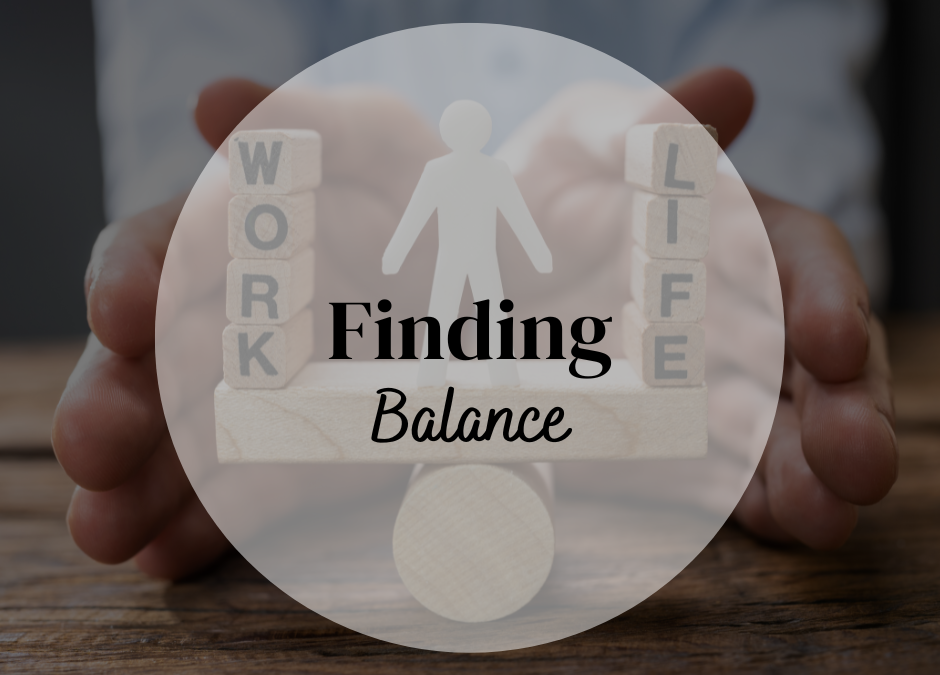
by Ace Concierge | Virtual Assistant | Jan 10, 2024 | Business Transformation, Business Values, Work Life Balance
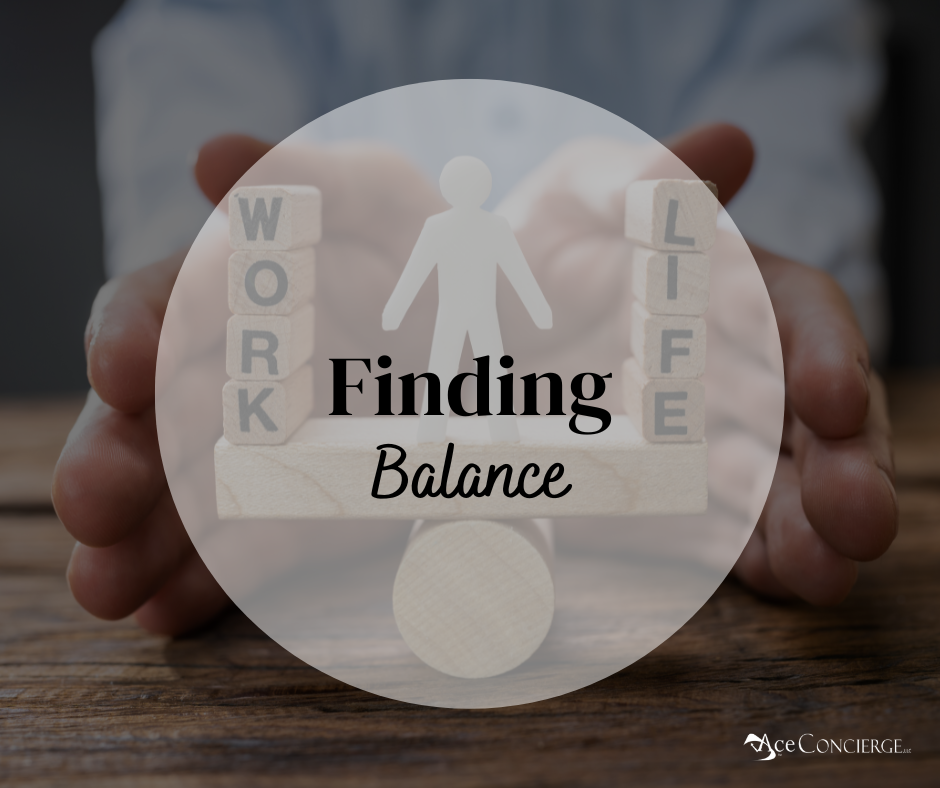
CEOs, often regarded as the superheroes of the business world, must keep their kryptonite in check to achieve work-life balance. The demands of the job have blurred the lines between work and personal life, leaving CEOs to feel like they are on call 24/7.
Despite the superhuman expectations, they are only human, and finding that sweet spot between work and personal life can be as tricky as navigating a minefield. The modern world’s constant barrage of emails, phone calls, and urgent matters can make it feel like the workday never ends, ultimately leading to burnout and stress, taking a toll on CEOs’ well-being.
The Work-Life Balance Myth:
The concept of work-life balance can often feel like an unattainable dream. The boundaries between work and home are blurred because of technology, leading to immense pressure for CEOs to be available round-the-clock. The instant accessibility makes it challenging for CEOs to disconnect from their work responsibilities.
The 24/7 Nature of Leadership:
CEOs are entrusted with the overall success and growth of their organizations. This responsibility comes with a 24/7 commitment, as crises can occur at any time, and critical decisions may need to be taken outside regular working hours. The demanding nature of the role often leaves CEOs with limited opportunities to switch off and enjoy personal time, impacting their overall well-being.
Strategic Planning vs. Personal Time:
CEOs must develop and implement long-term strategies to ensure the sustainability and success of their companies. This requires significant time and dedication, often cutting into personal or family time. Balancing the need for strategic planning with personal commitments becomes a delicate dance that many CEOs find challenging to master.
Family and Social Sacrifices:
One of the most significant sacrifices CEOs make in their pursuit of professional success is often felt in their personal lives. Long working hours, frequent travel, and the constant pressure to perform at a high level can strain relationships with family and friends. Important life events may be missed, and the emotional toll of such sacrifices can lead to feelings of isolation and loneliness.
The Weight of Decision-Making:
CEOs are faced with a multitude of decisions daily, each carrying its own set of consequences. The weight of these decisions can be emotionally draining, impacting the mental well-being of CEOs. The constant need to make tough choices and navigate through uncertainties takes a toll, making it crucial for CEOs to find effective ways to recharge and decompress.
The Role of Self-Care:
CEOs must recognize the paramount importance of self-care in their pursuit of work-life balance. While the demands of the role undeniably intensify, neglecting personal well-being can have severe repercussions. Engaging in regular exercise, ensuring adequate sleep, and practicing moments of mindfulness provide CEOs with the necessary resilience to navigate daily challenges.
Implementing Boundaries:
Establishing clear boundaries between work and personal life is essential for CEOs. Setting specific timeframes for work-related activities and creating dedicated periods for personal commitments help to maintain a healthier balance. Communicating these boundaries to colleagues, subordinates, and even family members is crucial for ensuring everyone is on the same page and respects the CEO’s need for personal time.
Delegating and Empowering:
CEOs often believe they must handle everything themselves. Delegating tasks and empowering capable team members is not a sign of weakness but a strategic move to ensure the sustainable growth of the organization and the well-being of the CEO. Trusting the team to handle certain responsibilities allows the CEO to focus on high-impact tasks and find pockets of time for personal pursuits.
Juggling work and life can feel like a circus act for CEOs. While there’s no magic formula, prioritizing self-care, implementing effective time management strategies, and finding that personal sweet spot can lead to a healthier and more fulfilling CEO journey.






